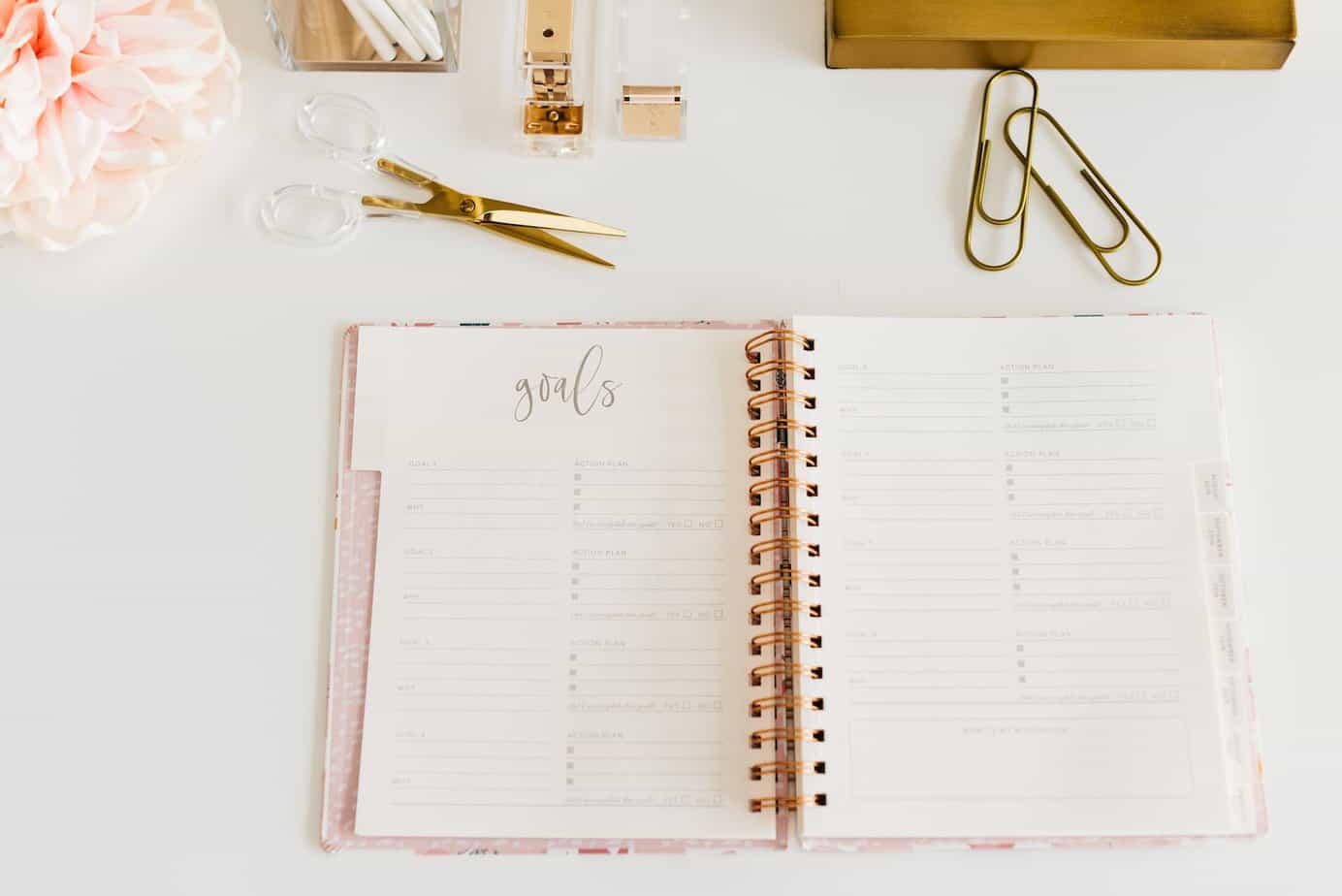How to actually set New Year’s resolutions you can stick to
New Year’s resolutions…ugh. I’m sure I’m not the only one who groans when we see someone’s “New Year New Me” proclamation on social media. After all, if it was easy to stick to New Year’s resolutions, why do we seem to make the same ones every year?
According to YouGov research, 91% of people fail to achieve their New Year’s Resolution, with 23% giving up within the first week!
While the new year brings a great opportunity to start afresh and set out what you want to achieve, I have never been a fan of setting new year’s resolutions designed to set us up to fail.
Even though Skinny Spending is in the personal finance space, these tips will work for any goal you might want to set.
I have personally followed these strategies to achieve goals to earn more money in my business, lose weight, increase my exercise, pay off debt, read more books…(but obviously not all at the same time!)

Set goals not new year’s resolutions
The dictionary definition of a resolution is a firm decision to do or not to do something. Whereas a goal can be defined as the object of a person’s ambition or effort; an aim or desired result.
See the difference?
A resolution already sounds tough – we have to resolve to do or not do something – and for a whole year to boot. Whereas a goal is something we want to achieve.
So instead of making a resolution to give up all treats and go to the gym 5 times a week, your overall yearly goal could simply be to get healthier. Although it sounds vague to begin with, in the next step we will nail down the specifics.
Another example could be rather than resolving to have several no spend days in order to reduce your outgoings (which are completely pointless in my opinion!), you could give yourself a spending budget for treats so you don’t feel so deprived.
Set SMART goals
One of the main reasons most resolutions fail is because it is really hard to stick to something for a whole year, especially if it is an unrealistic goal to begin with.
How long do you think a goal of going to the gym 5 times a week AND giving up all treats would actually last? And once it is broken mid January, many people just decide to quit the whole goal entirely.
SMART goals – that is goals that are Specific, Measurable, Achievable, Realistic and Time Based – are much more achievable for all of the reasons in this acronym!
If our goal is to “get healthier”, we can break this up into a SMART goal in the following ways:
Walk 10,000 steps per day
Workout 3 x 20 mins per week
Restrict our calorie intake to 1500 per day
Finance related specific goals could include:
Pay off £5,000 amount of debt by December
Make £200 per month by selling clutter on eBay
Invest £100 of my wages in an ISA per month
You can see how all of these goals are Specific and Measurable. The numbers are obviously just examples and would need to be altered to suit each individual, but it is assumed they are Realistic and Achievable based on that person’s current income or calorie intake etc.
Setting an unrealistic goal that is not achievable just decreases motivation to continue, so don’t be afraid to start with something easy. It’s still progress.
Lastly, you can see that each of these goals is time based – steps per day, workouts per week, make £200 per month. And yes, there will undoubtedly be days, weeks or months when the target falls shirt and that’s ok – just carry on.
Continually tracking and reviewing your monthly goals against your overall aims for the year definitely keeps you on track and more accountable.

Keep it simple
It can be so tempting to try and set goals for everything we think we need to fix in our lives such as eating better, working out, paying off debt, etc that it can get pretty overwhelming and nothing gets achieved.
If your resolutions have normally gone out the window after a couple of weeks, start off with one goal and see how well you can stick to it. Once you’re in the routine after a couple of months, you can start to add in something else.
Forgive yourself
Nobody is perfect, so if you have a spending binge (or a doughnut one) then allow yourself to accept it was just a bad day and move on.
Beating yourself up over one bad decision, or deciding to sabotage your whole goal just because you won’t have a perfect streak on your habit tracker is not helpful. Allow yourself to make these mistakes and get back on it the next day.
Track your results
Even though this was covered as part of the SMART goals in Step 2, it is so important it is worth mentioning again.
If you don’t measure and track your progress, you are far less likely to stick to your goals. It can be a scary prospect to actually face up to writing down that debt total number, or the number on the scales, but speaking from personal experience of both of these numbers, it is absolutely crucial to be brave and do so.
There’s no set way to track your results – you could use a notebook, diary, calendar, digital planner, app, spreadsheet, or the free goal tracker printables you can download here- the choice is up to you. But just checking in on the numbers weekly can give you a huge boost when you see them going in the right direction.
Be patient and consistent
In this world of instant gratification it can be all too tempting to expect miracle results after a few weeks. Whether this is losing weight, launching a new side hustle, paying off debt or something else entirely, results take time. If you consistently put in the effort, no matter how little progress you think is being made, over time these efforts will compound.
Many people give up far too soon because they don’t see any significant results within a few weeks. This is why tracking your progress and reviewing goals monthly is far more effective than just setting a resolution for the year – you can see exactly how far you’ve come and tweak your goals accordingly.
There’s nothing special about January 1st
As much as I hate the expression “New Year New You”, I have to admit the start of the year is a great time to reflect and set new goals. However, there is absolutely no reason why everything has to be perfect starting on January 1st.
It’s actually a pretty horrible time to start – if you’re thinking about paying off debt or saving money, you are probably broke than usual after Christmas.
If you’re determined to start a diet, there is likely to be Christmas goodies still lurking in the house. Give yourself a couple of days grace and ease into it.
And if you happen to be reading this at another time of year entirely, there is absolutely no reason why you can’t get started right now instead of waiting for January. What have you got to lose?!
Will you set goals or new year’s resolutions?
Has this post given you motivation to set some achievable goals instead of new year’s resolutions destined to fail? Leave a comment and share with the community.

About the Author
Melissa is a working parent who left behind a senior management salary for a better work/life balance. Following her own money saving and money making strategies she was able to clear debt and live a life she loves.
Blogging, selling digital products on Etsy and selling preloved items on eBay and Vinted are her favourite side hustles. Read her story here.
Other Posts You Might Like
1p Savings Challenge: How to Save £677.95 in 12 Months
Get started selling on eBay with this beginner’s guide
Get your meal planning sorted for the New Year with this toolkit






